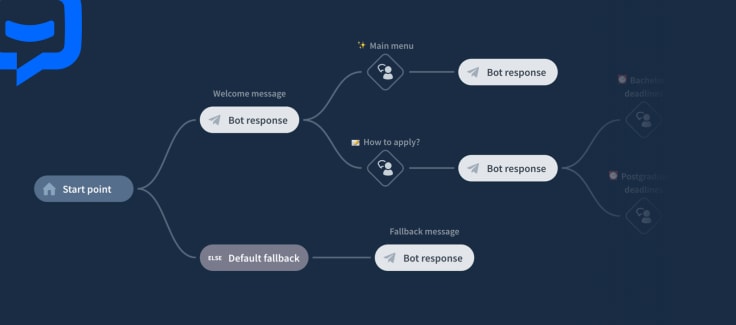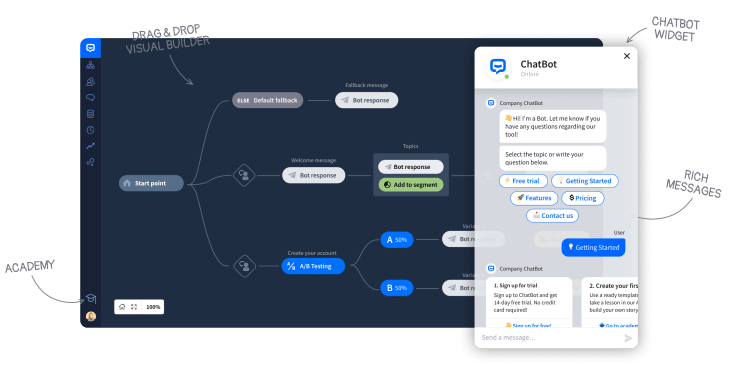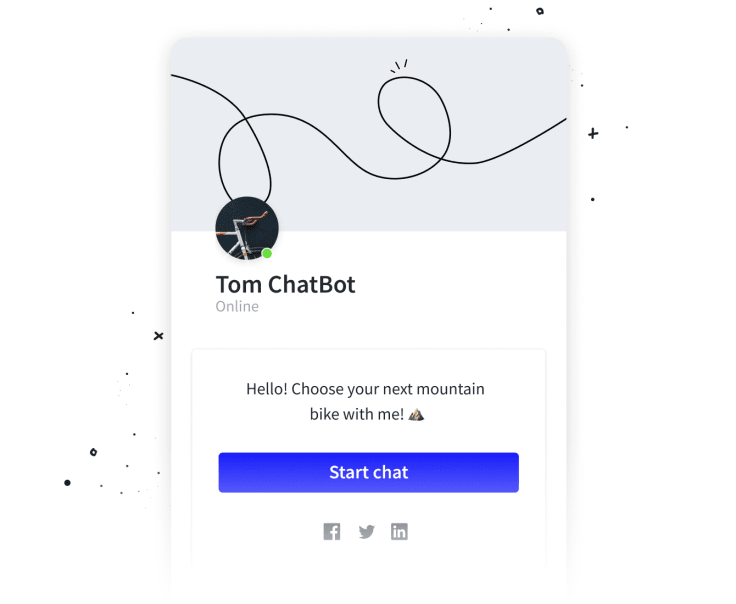Showing top 0 results 0 results found
Showing top 0 results 0 results found

Are you looking to streamline your customer service and boost your business's efficiency? In an era where speed and precision are key to customer satisfaction, implementing a chatbot can be a game-changer.
By the end of 2024, chatbots are expected to save businesses up to 2.5 billion hours of work, illustrating their potential to transform how companies interact with their customers.
In this article, we'll dive into how chatbot API can empower your business with a scalable messaging solution. We'll provide a detailed look at how embracing this technology can elevate your customer service and significantly impact your operational efficiency.
Stay tuned as we explore the features, benefits, and real-world applications of chatbots in today's digital landscape.
What is a chatbot API?
It enables the seamless integration of chatbot software, allowing for enhanced functionality and the ability to provide a consistent, unified customer service experience across different digital environments.
By using a chatbot API, businesses can extend the capabilities of their chatbots beyond a single platform, ensuring their customers receive instant and accurate responses, no matter where they choose to interact.
How does an AI chatbot API work?

With AI chatbot APIs, the magic stems from their capability to simulate human-like conversations, powered by a natural language understanding framework that interprets and responds to user inquiries. Unlike basic chatbots that follow a predetermined flow, AI chatbots utilize complex algorithms, machine learning, and access to vast datasets.
These elements work together to understand the context and intent behind user queries, making educated guesses to provide responses that are not only relevant but also incredibly accurate.
This process involves analyzing the user's message, identifying key phrases or words, and generating a response that feels personal and human based on the chatbot's training and available data.
This level of interaction is what sets AI chatbot APIs apart, offering users a more engaging and satisfying conversational experience.
Best chatbot APIs in 2024

This year is buzzing with innovative chatbot APIs. These tools are not just about automating responses but creating meaningful, efficient interactions that enhance customer engagement and service processes.
Let’s get a glimpse of the standout chatbot APIs that are reshaping customer communication.
ChatBot API
ChatBot sets itself apart as a leading solution for AI-powered bots. It is designed to offer instant, accurate responses generated by artificial intelligence to customer inquiries. This is achieved through a sophisticated scan of your website, help center, or other designated resources.

What sets ChatBot apart is its emphasis on a no-code, easily customizable AI large language model framework, allowing businesses to harness the power of generative AI without the need for extensive coding knowledge.
This independence from third-party providers ensures a unique blend of data security, customizable communication, and integration capabilities, making it an ideal choice for businesses looking to offer 24/7 support while maintaining data privacy and security.
With features like a no-code chatbot builder, versatile use cases, and comprehensive analytics, ChatBot provides an all-encompassing platform for enhancing customer experience and driving digital transformation.
Twilio Studio
Twilio Studio offers a robust, flexible environment for building chatbots that can engage customers across multiple channels. Its visual interface simplifies the creation of complex, interactive communication flows, making it accessible even to those with minimal coding expertise.
Twilio's strength lies in its integration capabilities, allowing businesses to connect their chatbots seamlessly with SMS, email, WhatsApp, and more.
This versatility, combined with Twilio's reliable infrastructure, makes it an excellent choice for businesses looking to build comprehensive omnichannel communication strategies.
Facebook Messenger API
The Facebook Messenger API opens the door for businesses to tap into the vast user base of one of the world's most popular messaging platforms. It enables the creation of chatbots that can carry out natural conversations, process transactions, and provide personalized customer support.
With features like quick replies, interactive buttons, and the ability to send rich media, businesses can create engaging experiences that drive customer satisfaction and loyalty.
The Messenger API's direct access to Facebook's extensive network makes it an invaluable tool for businesses aiming to expand their social media presence and engagement.
Slack bot API
The Slack bot API is tailored for the modern workplace, enabling businesses to create bots that can automate tasks, facilitate team communication, and integrate with an extensive array of third-party services.
Whether it's scheduling meetings, managing to-do lists, or automatically posting messages and real-time notifications, Slack bots can significantly boost productivity and streamline workflows.
The API's comprehensive documentation and supportive developer community make it an appealing choice for businesses looking to integrate advanced functionalities into their Slack workspaces.
Bot Libre
Bot Libre is an open-source platform for creating AI chatbots capable of engaging in natural conversations and learning over time. It emphasizes adaptability and user engagement. Its open-source nature allows businesses to customize and extend their chatbots as needed.
Bot Libre supports various languages and platforms, including web, mobile, and social media, making it a versatile option for businesses aiming to provide a consistent, intelligent customer service experience across multiple touchpoints.
Google Chat API
The Google Chat API is designed to facilitate the creation of bots that can interact seamlessly with Google Chat, part of the Google Workspace. These bots can help automate tasks, fetch information, and facilitate collaboration within teams.
The API's integration with Google Workspace tools like Docs, Sheets, and Calendar enables the development of bots that can significantly improve workplace efficiency and communication.
With its straightforward setup and Google's robust infrastructure, the Google Chat API is a powerful tool for businesses looking to enhance their internal communication and productivity tools.
Crisp Chat
Crisp Chat specializes in creating chatbots that provide a unified messaging platform, combining customer support, marketing, and sales functionalities into a single solution.
Its key features include real-time chat, email integration, and an intuitive chatbot builder. Crisp Chat's focus on creating a seamless customer experience makes it an excellent choice for businesses looking to engage their customers more effectively and convert leads with personalized conversations.
Explore the capabilities of conversational AI with ChatBot 🤖
Wit.ai
Wit.ai, powered by Facebook, enables developers to build chatbots and voice-based apps that can understand human language and respond intelligently. Its strength lies in its natural language processing capabilities, allowing bots to interpret user intent and take appropriate actions.
Wit.ai's open and extensible platform is particularly suitable for businesses and developers looking to create sophisticated conversational interfaces for any application, including voice-activated services.
Tidio
Tidio merges live chat and bots to boost sales and customer service. It offers automated responses and behavior tracking, which is especially useful for online retailers looking to personalize shopping experiences.
Intercom
Intercom’s chatbots excel in lead qualification and customer support, seamlessly fitting into a broader suite of messaging tools. It’s about creating real-time, personalized interactions that drive conversion.
HubSpot
HubSpot integrates chatbots into its CRM, automating conversations with visitors and leads. It’s about nurturing those interactions with a personal, analytical touch to guide them through the buying journey.
Zendesk
Zendesk streamlines support teams by handling routine inquiries with bots that triage requests and guide troubleshooting. It ensures a smooth, consistent experience for customers, no matter the query.
Drift
Drift focuses on conversational marketing, with bots that engage visitors, qualify leads, and book meetings. It’s about making every website visit a potential sales conversation, personalized and timed just right.
Wati
Wati harnesses WhatsApp’s popularity for business communication, offering broadcast messaging and CRM integration. It’s a straightforward tool for engaging with customers on a platform they use daily.
Ada
Ada automates interactions across channels with a focus on instant, personalized support. It’s a blend of efficiency and personal touch aimed at reducing wait times and boosting satisfaction.
ManyChat
ManyChat makes creating Messenger bots easy and ideal for engaging social media campaigns and lead capture. It’s about harnessing the power of chat for marketing with a simple, effective toolkit.
IBM Watson Assistant
IBM Watson Assistant offers AI-powered conversations that improve over time by learning from interactions. It’s for businesses seeking deep, intelligent engagement across a range of customer interactions backed by powerful analytics.
What is an open-source chatbot?

An open-source chatbot simulates conversations with users, mimicking human interaction. Its open-source nature means the software's code is freely accessible for modifications and improvements, fostering innovation and collaboration.
This transparency and community involvement lead to better quality and more customizable chatbots. Selecting the best open-source chatbot for your needs depends on your technological preferences and how others have successfully integrated such tools, allowing for a tailored approach to enhancing communication or customer service.
Best open-source chatbot platforms in 2024
In 2024, the open-source chatbot platform scene is vibrant, offering advanced solutions for crafting AI-driven, interactive chats. Beyond mere response automation, these platforms facilitate complex conversations, enhancing customer engagement, optimizing operations, and offering personalized experiences.
Let’s dive into the standout open-source chatbot platforms of the year.
Botpress
Botpress is hailed for its user-friendly interface and powerful backend, making it a favorite among developers looking to build advanced chatbots without deep diving into coding. It supports multiple languages and integrates easily with existing systems, offering a versatile foundation for any chatbot project.
Microsoft Bot Framework
The Microsoft Bot Framework provides a comprehensive suite of tools for building and deploying high-quality bots across various channels. Its integration with Microsoft’s cognitive services allows developers to add sophisticated features like natural language processing and machine learning to their bots.
Botkit
Botkit features a modular, extendable architecture that supports the development of rich, creative chatbot experiences. Its thriving community and wealth of plugins make it a robust framework for developers seeking flexibility and extensive third-party integration options.
Rasa
Rasa stands out for its focus on machine learning, allowing the creation of chatbots that can understand and process conversational nuances. It's particularly suited for developers looking to build complex, context-aware bots that learn from interactions.
OpenDialog
OpenDialog specializes in conversational AI, offering a platform that focuses on creating bots that can manage complex, multi-turn conversations. Its approach to design and deployment makes it ideal for businesses looking to implement conversational interfaces that require deep contextual understanding.
Botonic
Botonic combines React with a serverless approach, allowing developers to create chatbots and conversational apps that scale easily. It's particularly effective for building chatbots operating across web and mobile platforms.
Claudia Bot Builder
Claudia Bot Builder simplifies the deployment of chatbots on AWS, making it a great tool for developers looking for a quick and efficient way to get their bots up and running on a robust cloud infrastructure.
Tock
Tock is designed with enterprise needs in mind, offering a scalable solution for developing chatbots and voice assistants. Its focus on conversational agents for business applications makes it a strong contender for companies looking to enhance their customer service or internal workflows.
BotMan
BotMan is a PHP chatbot framework that stands out for its ease of use and ability to integrate with a wide range of messaging services. It’s a go-to for PHP developers wanting to add conversational interfaces to their applications without a steep learning curve.
Bottender
Bottender takes a JavaScript-centric approach, offering a flexible, declarative API for building chatbots. Its emphasis on the React philosophy allows for the development of highly interactive bots with minimal boilerplate.
DeepPavlov
DeepPavlov is built for developers diving into deep learning and natural language understanding. It provides a set of pre-built models and tools for creating sophisticated AI-powered chatbots, making it ideal for academic and research-focused applications.
Golem
Golem is a newer entrant to the chatbot arena, focusing on decentralized computing to power its chatbot applications. It offers a unique approach for developers interested in exploring the intersection of blockchain technology and conversational AI.
Cleverbot
Cleverbot stands apart with its ability to learn from human input, providing responses that can be surprisingly nuanced and human-like. While not a platform in the traditional sense, it’s a fascinating example of AI-driven conversational technology for those interested in the cutting-edge of chatbot development.
Who are chatbot APIs really for?

Chatbot APIs are perfect for developers who are building websites, apps, or any software that needs to chat with users like a human would, but without actually having a person typing away on the other end.
If you want to give your users answers that fit their questions right when they ask them, a chatbot API can be your go-to tool. It’s all about making your digital product smarter and more helpful, automatically.
Whether you’re creating an online store, a customer service portal, or an educational app, integrating a chatbot can significantly enhance user interaction, making your app not just more engaging but also more efficient.
What are the benefits of a chatbot API?
Chatbot APIs streamline the process of integrating smart, conversational assistants into your digital platforms, making them a go-to for enhancing user experience with efficiency and security. Here's why incorporating a chatbot API can be a game changer for your website or app.
Quick setup
Forget the lengthy development cycles; chatbot APIs allow for rapid deployment. Imagine wanting to add a helpful assistant to your online boutique. Instead of spending days coding, you can simply copy a bit of code from the chatbot's documentation, tweak it to match your brand’s voice, and embed it into your site. In minutes, your customers are interacting with a bot that guides them through your catalog, making shopping a breeze.
Cost-effective
Using a chatbot API isn't just about saving time; it's also about saving money. Instead of allocating resources to develop a chatbot from scratch, you can leverage existing APIs at no additional cost. For small businesses or startups, this means offering 24/7 customer service without the overhead of extra staff. It’s like having an always-on customer service agent without the hefty salary.
Enhanced security
When it comes to digital interactions, security is non-negotiable. Chatbot APIs are developed by experts who rigorously test them for vulnerabilities, ensuring that your chatbot is as secure as possible. This means when you add a chatbot to your educational website, for instance, you can assure your users that their interactions are protected, from course inquiries to personal data sharing.
Conclusion

Chatbot APIs in 2024 offer businesses unparalleled opportunities to enhance their digital platforms with intelligent, conversational agents.
Chatbot APIs are reshaping how businesses interact with their customers, from enabling quick setup and reducing operational costs to providing secure and personalized customer experiences.
As we've explored, platforms like ChatBot.com lead the charge by offering easy-to-integrate, sophisticated solutions that require no coding knowledge, ensuring businesses of all sizes can leverage the power of AI.
Ready to transform your customer engagement and streamline your operations?
Explore ChatBot today and discover how our leading chatbot platform can empower your business to thrive in the digital age.



